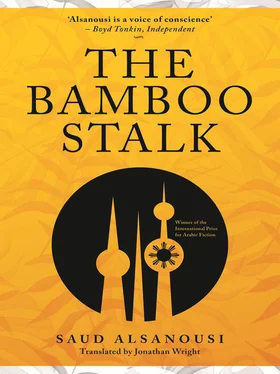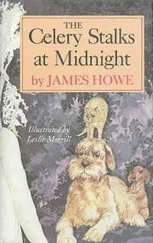At least once every ten minutes someone would wake up, call for the warder and ask to go to the bathroom. I don’t know how the others managed to sleep, what with the cold, the loud snoring and the wailing of the Filipina woman in the cell nearby.
I had my knees pressed up against my chest and my back against the wall. The later it was at night, the more desperate I felt about the prospects of getting out of the place. When I sent the text message to Khawla, I never imagined I would have to stay long in detention, but nothing of what I had hoped came about. Had Khawla abandoned me?
Late at night, when everyone else was asleep, I heard the sound of footsteps coming down the corridor. Steady footsteps. I looked up at the metal bars and saw a policeman walking past our cell without looking aside and then continuing down the corridor. The sound of his footsteps stopped. I heard the jangling of keys and hushed whispers. Someone opened the metal door. The Filipina woman had apparently been sleeping but now she woke up. She resumed her crying and pleading. Someone closed the door. The sound of footsteps returned, coming closer. I was still looking through the bars. The men around me were still snoring in their sleep, oblivious to the woman’s crying. The policeman walked past in the other direction, his body erect, his face fixed firmly forward. This time the pretty Filipina girl walked confidently behind him. She looked towards the cell I was in. We made eye contact for a moment as she passed. She raised her eyebrows and gave me a smile that reminded me of what she had said in the van. They disappeared. I stayed awake till morning thinking about the girl. Somewhere she was making illicit payment for her residence permit before being released.
I wondered whether my aunt Hind, who was interested in human rights, knew what was happening here. Should I tell her what I had heard and seen? And most importantly, would she be able to do anything if I told her what was going on in the cells?
On the first day after the weekend my name was called. I stood to attention in front of the policeman, with the iron bars between us. He asked me for the keys to my flat. I gave them to him and he went off without saying a word. About an hour later I was taken to the room of the officer in charge before I could be released. I found Ghassan waiting for me there: he had brought my papers to the police station and he spoke to the officer, who was polite with us. He gave me my mobile phone back and apologised. ‘Don’t forget your wallet next time,’ he advised me.
I left with Ghassan. In his beloved Lancer on the way home, he said, ‘Khawla told me on the first day and I did everything I could.’
‘Thank you,’ I said, interrupting him. He didn’t say anything more. His silence irritated me on the way. I wanted him to talk, to defend himself against Grandmother’s allegation that he was taking revenge on the Tarouf family through me. I wanted him to make excuses or show regret for what he had done if he couldn’t justify it. But he stayed silent, adding to my anger with him. I looked towards him when he was busy driving. I examined his face. Damn you, Ghassan, your face isn’t the real you . Some of the sadness on his face touched me deep inside. I looked away, out of the window, to escape his sadness and my own uncertainty. Like Grandmother, I wondered what Ghassan wanted to gain by helping me this time.
6
In one of our webcam chats I asked my mother about Merla. ‘We haven’t had news of her for some time,’ she said. ‘When we asked Maria, she said she didn’t know anything about her. Your aunt Aida is going almost crazy. Hasn’t she been in touch with you?’
I said I hadn’t logged into my email account for a while. I logged in straight away. I found it was full of adverts, along with one message from Merla that she had sent nine days earlier. She had left the subject line empty.
‘José! Can you see me?’ Mother asked me, waving her hand at the camera.
I was busy with my email. ‘Yes, Mother, but I’m busy. Let’s talk later,’ I said. I turned the webcam off and went back to my email. I deleted the adverts and kept Merla’s message without opening it straight away. Something told me the message contained unwelcome news. She had signed off her previous message with a quote from Rizal: The victim must be pure and spotless if the sacrifice is to be acceptable. What was this crazy woman referring to?
Just as she had ended her previous message with a Rizal quote, so she started her next message:
José,
‘Death has always been the first sign of European civilisation when introduced in the Pacific Ocean.’ Do you remember that saying of José Rizal’s? Anyway, I’m reminding you of it. You may wonder what this has to do with my message. I don’t know myself, but it’s been on my mind for days. Is it a prediction that comes true for everyone who goes near Europeans? I’m not talking about death during the occupation, which is what Rizal meant, but another death. When that unknown European man invaded Aida’s body, he left me like a seed in her womb and disappeared. A few days before I was born death showed up and snatched away my grandmother, who I’ve only seen in photographs. Ever since then death has lodged in our house without us noticing, disrupting our lives, even if our hearts have kept beating. Aida, who you love and call Mama, has been dead a long time, ever since the massacre of the cocks that we — you and I — heard about when we were growing up. I was born dead, in a living body. Aida nursed me on death from her breasts, which I hate because they were readily available to the hands and mouths of disgusting men, one of whom — I don’t know which — was my father. The death that Aida nursed me on is now feeding on my feelings year after year. I grow up and my feelings die towards macho men and submissive women and whatever hatches from their eggs.
José, do you remember something I said years ago in Biak-no-Bato? You may not remember, but I remember. You told me that only cowards who can’t face up to life try to commit suicide. Do you remember now?
I was annoyed when you unintentionally described me as a coward. I didn’t want to be a coward. But today I feel differently. Yes, I’m a coward and I haven’t been able to go on living complacently. In what you said to me in Biak-no-Bato, you told me half the truth and left out the other half. Those who try to commit suicide are either cowards who can’t face up to life or brave people who are able to face up to death.
Do you think that European man gave me life by invading Aida’s body? I won’t let him change what Rizal said: ‘Death has always been the first sign of European civilisation when introduced in the Pacific Ocean.’
MM
* * *
Some families in the Philippines with Chinese Buddhist roots hire people to mourn for their dead. These rites are usually performed in temples. The idea is that the mourning helps the soul move on to the other life and find acceptance there.
After reading Merla’s letter, I needed to perform such a ritual. I needed to have loud weeping and wailing in my flat, simply because I was so shocked that I couldn’t shed a tear. Was it the surprise? Or was it because I dismissed it in disbelief? No, Merla isn’t dead. Merla’s still alive , I said to myself. One day we’ll meet again. She’s no longer Catholic and nor am I, and I’m the only man she doesn’t feel hostile towards, she said. My old dream will now be easy to achieve . I was sitting at the laptop ranting to myself, unable to believe that Merla. .
* * *
With their compassion, women are more than human. All I needed was the embrace of a woman, a mother, a female friend or a sister. I called Khawla and said, ‘I want to see you.’ She didn’t object. In fact she was very pleased. I rode over to Qortuba on my bike. I didn’t plan to tell her about Merla. I just wanted not to have to think about Merla’s message. I could have spoken to my mother again on the webcam but I was worried about telling her about the message because, if I did, I would kill Mama Aida.
Читать дальше












